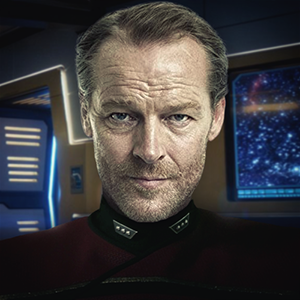If Beckett looked up, he could barely see the tops of the spires of Rencaris’s capital city, Vedrex – but he could see the surveillance drones. Metres above their heads, they buzzed along streets heaving with the bustling population of this old Romulan colony and its myriad of visitors. Down the wide boulevards lined with high-end shops and cafés, or the narrow streets cutting from the shopping district to the museum district, wherever they went, they were watched. Everyone was watched.
‘The more things change, the more they stay the same,’ Beckett mused as they walked into the open, busy plaza before the Rencaris Institute of History and Culture. The fat sun of late afternoon struggled to peek between the city’s vast towers, but even if it reached the square, the looming statue of Rencaris’s founder at the centre of the plaza’s array of decorative fountains was enough to blot out the light.
‘You suspect a continuation of Tal Shiar social surveillance?’ asked Starik, unmoved as ever, somehow walking through the crowd like it was nothing when Beckett felt he had to jostle and elbow his way forward.
‘Not literally Tal Shiar surveillance. Or we’d feel the hand of the Free State shoved up Rencaris’s arse. But you don’t need Tal Shiar letter-headed paper, or even their playbook, to run an authoritarian surveillance state.’ Beckett kept his voice low but casual, a tone where nobody in a crowd would pick up on his words unless they were trying very hard. Rather than a full-on disguise, he wore a soft brown leather jacket and had crammed on a black baseball cap and stuffed his ears inside. It wouldn’t pass scrutiny, nor could he be accused of hiding, but at a glance, neither of them would draw attention in a sea of mostly Romulan faces.
But not exclusively Romulan. Particularly here, in the tourism-focused parts of the capital, visitors from a dozen species punctuated the crowd. Rencaris wanted the wider sector, the wider quadrant, to feel they could visit, do business, socialise. They just kept everyone under tight surveillance all the same.
The museum itself was a looming, impressive building of traditional Romulan architecture, its grey-green walls built with a local stone that looked akin to serpentine, to Beckett’s eye. Columns framed the entrance, intricately carved with figures he didn’t recognise and suspected had some local rather than wider cultural import. Large, arched windows gave glimpses into the vast halls beyond, but were too high from the ground to give him anything but a tease from the outside, and likely let sunlight spill through inside. A massive domed roof crowned the structure, softening the harshness of the building’s corners and giving it a sense of stoic grandeur.
Inside, they joined a thin queue of tourists winding through the vast atrium, built such that a hundred excitable voices didn’t echo and disorientate. Beckett took the lead, not wanting Starik to be betrayed by his Vulcan demeanour, even if a low cap earned him some suspicious glances from the ticket staff.
Still, Starik butted in halfway through the transaction, staring directly at Beckett. ‘We should acquire an audio guide.’
‘I’m pretty sure the interpretation panels at Rencaris’s premier museum will -’
‘You will assume you know things,’ Starik pressed on without missing a beat, ‘and speak. With an audio guide, that will not happen.’
‘Are you saying that with an audio guide, I won’t speak, or with an audio guide you won’t have to hear me?’
‘Only you can determine that outcome. Either way, I am sure to hear an accurate retelling.’
Beckett paid extra for the handheld device to give them an audio tour, gritting his teeth. Only once they were past the desk and heading deeper into the museum did he hiss, ‘I didn’t want to say anything there ‘cos I expect the audio guide to be even more explicit propaganda. So if you think I’m going to be less vocally critical with this thing trying to convince me about the glory of Romulus…’
‘Then so be it; you will have more evidence for your point. Remember that I am a graduate of the Vulcan Science Academy, however, and am well versed in the pertinent eras of history.’
‘Or the Vulcan propaganda version of the exodus,’ Beckett muttered.
Starik, of course, heard him. ‘The version rooted in the logical analysis of historical record -’
‘Written by who? And of course your social framework’s analysis of your history is gonna be sympathetic!’ Beckett threw his hands in the air. ‘STEM kids. You take one humanities module because it’s required and you think history’s just about memorising facts. That’s not scholarship.’
They would prove to agree to disagree. Or, perhaps, to just disagree. The museum’s halls led them first through to a section on the Vulcan exodus, where the audio guide told a story of how an oppressive regime seized control of the planet, suppressing the rights of individuals to their thoughts and feelings until the flight of a large group of brave dissenters seeking freedom.
‘A clumsy misinterpretation,’ said Starik as he studied an intricate set of models of the exodus fleet. ‘The passions of our people were driving us to self-destruction.’
‘Sure,’ said Beckett, though his eyes were more on the models. ‘But what about if you were a resident of Vulcan and didn’t want to give up the right to feel your emotions and express them?’
‘There were no legal inhibitions or restrictions.’
‘Just societal pressure to never so much as laugh in public. Right?’
‘You presume this transition was not long and arduous for all of Vulcan society,’ said Starik, brow furrowing in thought. ‘All were provided with support.’
‘I’m sure that if it was difficult, you were helped. I’m saying, what if you didn’t want to live like that?’
‘The alternative was destruction.’
‘And yet, the Romulans built an empire that lasted two thousand years. And it wasn’t their passions that destroyed them. They became one of the greatest powers of the galaxy, while the Vulcans had to get subsumed by the Federation.’
‘There is no shame in collaboration, nor is geopolitical might the sole standard of -’ Starik stopped himself, the furrowed brow deepening. ‘You seek to provoke me. You are aware this is a wasteful endeavour, yes?’
‘I think I successfully provoked you.’ Beckett smirked. ‘But what I actually did was make a point. Your facts are based on your framework, your standard of success, of societal wants and needs.’ They’d continued to wander the halls now, passing a somewhat ramshackle set of exhibits about the exodus itself, which featured more information boards than actual artifacts. Through a set of double doors was the next section, with a large holographic display hovering overhead simply titled ‘The Founding of Rencaris.’
‘What’s not logical,’ Beckett said in a more conciliatory fashion, ‘is the song and dance they make about the exodus and the link to Rencaris’s history, when Rencaris wasn’t settled until a century after Romulus. And not by any of the remains of the exodus fleet.’
‘It is an effort to establish a sense of lineage,’ said Starik. ‘Nation-making requires such myths.’
‘Funny, your analysis is at its best when it’s cynical but not partisan.’ They paused at the doors to the section on the founding as a group of Romulan schoolchildren were marched up the corridor. Beckett knew better than to get in the way of a school trip, but let the droning of the audio guide wash over him as it tried to link specific ships of the exodus to the founding, and listened to the rather wild-haired teacher at the head of the group.
‘…and the founders uncovered a wilderness in this region, particularly this close to Klingon space,’ she was saying, even as she appeared to be checking and double-checking she had the right number of children in the group. ‘By settling Rencaris, our ancestors didn’t only secure the homes we live in today, but brought civilisation and order to a chaotic region…’
‘Impressive,’ mused Beckett as she led the children on ahead. ‘She can manage a pack of twelve-year-olds and spout colonial propaganda at the same time.’
‘A versatile skillset,’ agreed Starik, as always more receptive to dry wit than open humour. They gave the school trip a wide berth before following.
Once inside the next section, Beckett stopped before a tall display. Behind one glass case were the faded and tattered remains of an ancient tapestry; beside it, bright-coloured and intact, was a holographic representation of how it had originally looked.
‘There’s not a single picture of that thing here,’ he pointed out. ‘Contemporaneous, I mean.’
‘You think the completed image a falsehood?’
‘No, I mean – maybe. I’m just curious what they based it on.’ Beckett’s eyes swept from the text of the tapestry to the display board beside it. ‘It was made to commemorate the Imperial Senate’s decision to expand the borders this far. “The Walls of the World,” they called this sector.’
‘“The border of known space,” surely,’ corrected Starik.
‘No, see – huivaraen as a word isn’t just boundary, it’s got implications of protectiveness and support.’
‘Is walls the best analogy? Translation ought be more direct and literal, rather than imagining evocative implications that may not -’
‘Don’t make me move from historiography to translation,’ Beckett groaned. ‘The point is how this has shaped Rencaris’s identity. The edge of the empire. Barbarians beyond in the wilderness.’
Their advance became more meandering afterwards, the two men through the rather deifying exhibit about Rencaris’s heroic founder, Rhamanath, depicted in the museum as a visionary and pioneer. Beckett thought he sounded more like a bureaucrat appointed by a board of colonial affairs on Romulus.
Then again, most such figures probably were. Someone had probably convened a hiring panel somewhere for Jonathan Archer, after all.
‘They are a proud people,’ mused Starik as they progressed. ‘But these exhibits have changed. They are more recent, modern. They mention the supernova. It is curious.’
‘You thought they’d be more reflective?’ Beckett shook his head. ‘The myth changes. Once, it was belief in Romulus. Now, it’s belief in Rencaris. The walls of the world. But the barbarians aren’t just to the trailing border. They’re everywhere.’
Starik paused in front of a display showing the holographic image of Romulan ships in a pitched battle against Klingon vessels. ‘They were not only trailing. Once, rimward.’
‘Ooh.’ Beckett leaned in. ‘They’re always so cagey about the nature of the Klingon-Romulan conflicts of the late-twenty-third century…’
‘I had not known Klingon ships penetrated Romulan space this far,’ Starik admitted.
‘They probably took the same route the Suv’chu did,’ Beckett mused, reading. ‘The House of Konjah leading the attacks. Woah.’
‘Woah?’ It sounded, from Starik’s lips, like a computer trying to approximate the emotion.
‘The purpose was to devastate Rencaris’s shipyards to deny their frontier forces a fallback point for repairs. Over one hundred thousand dead as one of the orbital platforms fell to the surface.’
‘So say their records.’
Beckett blew out his cheeks as they read on. ‘And then the strike in retribution on the border world of Q’alah, Klingon territory. One-twenty thousand dead.’
‘It reads far more as the intentional inflicting of mass casualties. Including civilian,’ Starik pointed out. ‘Phrased in that same celebratory manner. Phrased also as if it is something of which the people of Rencaris should be proud.’
‘Hurt us, and we’ll hurt you worse,’ mused Beckett. ‘Not the worst principle to motivate a populace with their backs against the wall.’ He raised his hands at Starik’s look. ‘I’m talking as a pragmatic tactic! Not an admirable one!’
‘And yet we come here to find Rencaris considering some form of concord with a Klingon House. In defiance of their own kinfolk, and a government that has never inflicted atrocities upon them.’
‘Some might think the Federation abandoning Romulus was an atrocity,’ Beckett pointed out mildly. He glanced up at the tall doctor. ‘Was it logical for Vulcan to campaign in favour of that? Leaving their own kinfolk?’
‘We are not kin,’ said Starik with a bluntness that surprised Beckett. ‘Genetics are less significant than culture and values to bond people. This is why Vulcan made common cause with the Federation, and not the Star Empire.’
Beckett worked his jaw, and decided he didn’t want a blazing row with a Vulcan about the Romulan evacuation in the middle of Rencaris’s centre of historical remembrance. ‘Times change, I guess,’ he said, knowing it was a brush off, feeling a little guilty for not challenging Starik’s perspective. ‘Friends are foes, foes are friends.’ He nodded further down the halls. ‘Let’s see how else they turn things upside-down, huh?’

 Bravo Fleet
Bravo Fleet










